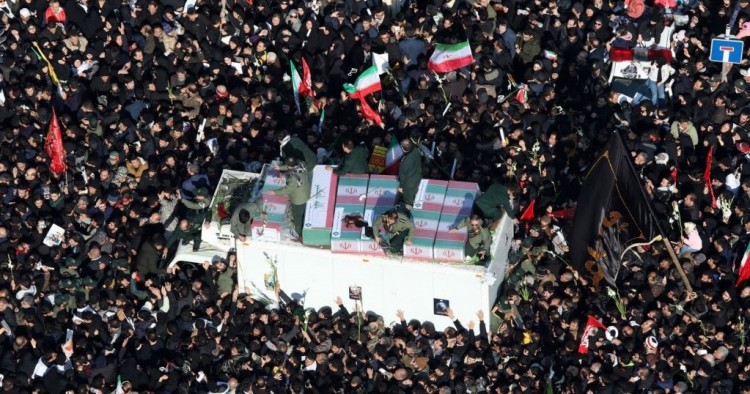Escalation with Iran now dominates 2020
Paul Salem
President
The escalation with Iran and its repercussions in the Middle East and for U.S. national security, and possibly, U.S. elections, has moved to the front of the queue in terms of a key driver for 2020. Escalation might also have effects on energy markets and hence on regional and global economies.
The killing of Gen. Qassem Soleimani has triggered the most acute escalation in U.S.-Iranian relations since 1979, with both sides promising large-scale retaliation. From the Iranian side the response is to be monitored in two main arenas: first, in Iraq, Tehran is already leveraging the attack to put more political and security pressure on the U.S. to leave the country. The U.S., under Barack Obama, already got out of Iraq once; if things get difficult, Donald Trump might trumpet the killing of Soleimani as victory and keep his promise to his base of “bringing the troops home.” Outside Iraq, Iran has promised to target U.S. military personnel and bases; it might also target U.S. diplomatic or political figures. Hezbollah leader Hassan Nasrallah insisted that the “resistance alliance” would not target U.S. civilians.
On the U.S. side, until recently, Trump had chosen not to respond forcefully to Iranian provocations that have been occurring since May 2019; but he has taken such a forward-leaning and aggressive position now — threatening massive retaliation inside Iran — that he has set himself, and the U.S., in a conflict trap that he might not be able to defuse. The U.S. and Iran are now in a traditional escalatory slope, and although neither side wants war, there is a real risk that it might happen.
If it does, the U.S. — as Trump has threatened — will likely hit a wide array of military and regime targets in Iran, while Iran would target U.S. locations throughout the region; however, it might also unleash missile barrages against U.S. partners the UAE and Saudi Arabia. I doubt that Hezbollah will target Israel, as that would add a major front that they would prefer to avoid.
The possibility of de-escalation still exists. Neither side actually wants a war; and Iran has not responded heavily to major assassinations in the past (such as the killing of Imad Mughniyeh), even though at the time they had promised all-out responses. They have been known to exercise “strategic patience.” If they figure they can push out the U.S. from Iraq (at least from the Arab part, if not the Kurdistan region), they can consider that a strategic victory, and otherwise plan limited attacks on U.S. assets. International and regional efforts should be ramped up intensively to talk both sides back from the brink, and to find a pathway to de-escalation.
In other parts of the region, 2019 had ended with large-scale uprisings in Iraq, Lebanon, and Iran, and there were ongoing popular movements in Sudan and Algeria. The uprisings in Iran and Iraq will certainly be negatively impacted by the escalation with the U.S. In Iran, the killing of Soleimani has brought out nationalist sentiment, and gives new vigor for armed security forces to hit hard at any future protestors. In Iraq as well, the escalation involving the U.S. has changed the narrative and animated the pro-Iran militias; this will make reviving the domestic reform-oriented protest movement difficult. In Lebanon too, the escalation has — at least temporarily — changed the narrative; and it also has animated Hezbollah. Lebanon will see a new government soon, largely handpicked by Hezbollah and its allies; this new government will likely focus on making across-the-board changes in security personnel to make sure state security institutions are in step with the new “with us or against us” mood of Iran and its proxies. Meanwhile, the Lebanese economy will likely see its most painful collapse and contraction in modern times.
We hold out hope that the Sudanese and Tunisian transitions will keep moving forward, and that Algeria will find a better path than the ruling regime has offered so far.
Otherwise, the biggest event — short of war with Iran — that the region is waiting or bracing for is the U.S. election in November 2020. The U.S. remains an overbearing presence in the Middle East, and how goes the White House will have a great bearing on how the region rings out 2020 and looks to 2021.
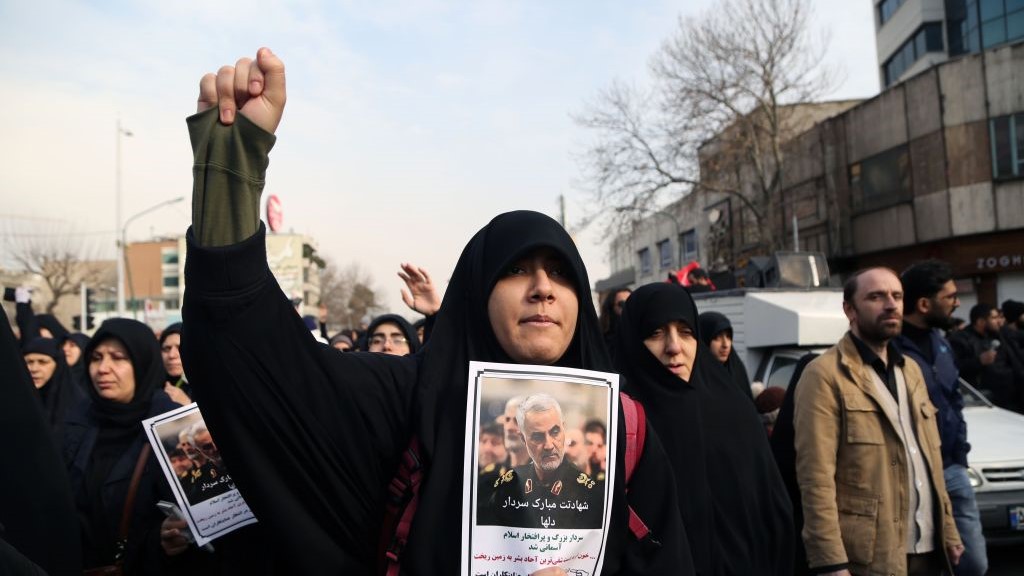
US “maximum pressure” and Iranian “maximum resistance” will come to a head in 2020
Alex Vatanka
Senior Fellow
In 2020 Tehran’s policy of “maximum resistance” against the Trump administration’s “maximum pressure” campaign will be put to the test more than ever before. Domestic and foreign policy challenges will continue to abound for an Iranian regime that in 2019 came to the brink of losing control over an increasingly restless population. But while the fluidity of the situation in Iran makes predications particularly daunting, a few likely courses of action are clear.
Above all, the Trump administration’s assassination of Gen. Qassem Soleimani on Jan. 3 has definitively closed the door to any direct talks between Washington and Tehran in 2020. The best that can happen now is that the Iranian regime reaches the conclusion that there is an eventual need for dialogue with the U.S. and begins to prepare the ground. But the breakthrough can only happen once Donald Trump is out of the White House in either 2021 or 2025.
Tehran will do what it can to avenge Soleimani’s death, to save face at home and abroad, but it will not seek a direct military confrontation. That said, emotions will run high and the possibility of miscalculating and inviting a major U.S. response is a real risk that Tehran will take into account. Iran’s first choice will be to weaken the American presence in the region to the extent possible, starting with Iraq, a campaign that is already in full swing and will continue throughout 2020.
The Iranians have almost entirely abandoned their commitments to the 2015 nuclear agreement, citing non-compliance by other parties and Washington’s May 2018 decision to withdraw. Iran’s position on its ratcheted-up nuclear activities will not change in 2020 unless Tehran is somehow given relief from U.S.-led sanctions. In 2019, Tehran hoped the Europeans would deliver economic incentives to stay in the deal. That never happened and Europe is highly unlikely do so in 2020. In fact, the European position on Iran will likely toughen since the Germans, the French, and certainly the British under Prime Minister Boris Johnson will ultimately move closer to the Trump administration. But while Iran will stay in the nuclear deal in name only, it is unlikely to dash for a nuclear bomb in 2020 or withdraw from the Non-Proliferation Treaty (NPT). Neither will go down well with Russia or China, two countries that Tehran will seek to move closer to in 2020 to ward off American pressure.
On the home front, Supreme Leader Ayatollah Ali Khamenei, in close coordination with the leadership of the Revolutionary Guards, has a simple blueprint to survive in the short term: Any anti-regime protest will be crushed. Meanwhile, any political change will be instigated from the top down and not bottom up, meaning that Khamenei might accept the need for some concessions — such as allowing more candidates to run in the February 2020 Majlis elections — but the regime will not make overt concessions. Khamenei’s game plan is to merely make tactical changes to reduce pent-up frustration in society while pretending the public anger and protests are part of a foreign-led plot.
Another strategy of the Khamenei-Revolutionary Guards circle is to present the Iranian people with a bad choice and a worse choice. The “bad choice” is that the Iranian people should be patient and accept the state of affairs since the country is essentially said to be in war against the U.S. But, the Khamenei-Revolutionary Guards camp claims, this will soon blow over and the Islamic Republic will survive.
The “worse choice” is that alleged foreign plots succeed and Iran becomes another Syria. In fact, the idea of a civil war and the “Syriazation” of Iran are increasingly the talking points of key regime officials. Recent claims by Tehran to have confiscated U.S. weapons coming in from Iraq are part of this game plan. Khamenei and the Revolutionary Guards are hoping that by invoking images of a “civil war” instigated by foreigners, they can demobilize a good part of the Iranian public. The regime’s calculation is simple. It knows that Iranians are angry with the state of affairs but fear the idea of civil war more than having to live with the Islamic Republic.
In 2020, Khamenei will be busy preparing for what happens after he dies. In 2019, Khamenei replaced some key top officials in charge of massive economic organizations and operations in Iran. Meanwhile, in his last full year as president, Hassan Rouhani will continue to be unable to make up his mind about whether he wants to be a transformative president or merely an underling of Ayatollah Khamenei. Rouhani made headlines in 2019 by declaring that people should not have expectations from him since he has “no power.” This was certainly a jab at Khamenei and the organs he controls, such as the Guardian Council and the judiciary, that have the power to stop the legislative process that takes place in the Majlis.
Rouhani’s comment that “no change in Iran is possible until distribution of power is changed” was not only an attack on Khamenei but also shows that he may be looking to create some distance from the supreme leader. There are two possible reasons for this. First, Rouhani does not want all of the blame for the country’s economic and social problems. Second, Rouhani wants to present himself as a “moderate” who would be a different kind of supreme leader should he be able to succeed Khamenei. But his time as president is almost up and it is highly unlikely that Rouhani will be able to shift Iran’s domestic and foreign policy course in 2020. That is already decided by Khamenei and the Revolutionary Guards, and Soleimani’s assassination has injected a big dose of Islamist militant revolutionary zeal in their political vein.
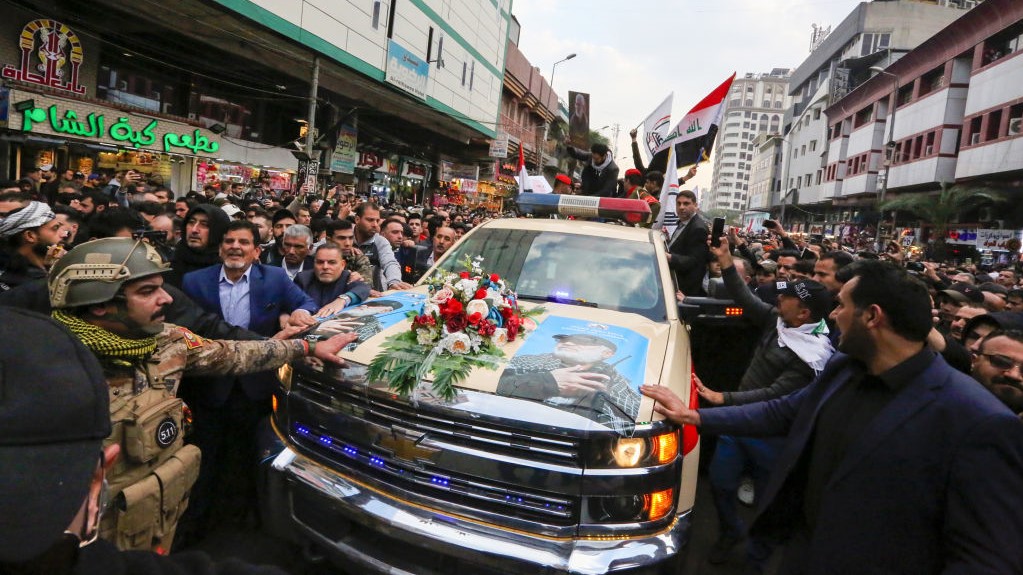
Iraq is right where it doesn’t want to be
Randa Slim
Senior Fellow, Director of Conflict Resolution and Track II Dialogues Program
Iraq is entering 2020 in a situation it has long sought to avoid: stuck in the middle of an U.S.-Iran military escalation. The killing of Revolutionary Guards Quds Force commander Qassem Soleimani on Jan. 3 on Iraqi soil and the expected Iranian retaliation, part of which will likely unfold in Iraq, have created political and security dynamics that are bound to bring to an end to the U.S. force presence in the country. While yesterday’s vote in the Iraqi Council of Representatives (COR) on a decision to remove U.S. forces is not legally binding, it creates dynamics inside the U.S. and Iraq that make a U.S. decision to remove its forces all but inevitable. Despite U.S. President Donald Trump’s threats to impose sanctions on Iraq in response to the COR decision, the timing and conditions for a U.S. force withdrawal remain unclear. The Iraqi prime minister met today with the U.S. ambassador to Iraq to discuss the need for joint action to implement the COR decision.
What are the implications of these developments for Iraq?
- The protest movement that started in October, part of which was motivated by demands to rein in Iran-linked Iraqi militias like Kataeb Hezbollah, has hit a major roadblock. Instead of making concessions, these militias now feel emboldened to pursue any party that stands in their way, including the protesters.
- The COR vote yesterday was boycotted by Kurdish and Sunni parliamentarians with few exceptions. As Iran and its Iraqi militias hold more sway over the political space in Iraq, Sunni and Kurdish leaders and their constituent communities will start contemplating measures to protect themselves. While support for ISIS is at an all-time low among Iraqi Arab Sunnis, Iran-linked Iraqis militias have not been the picture of law and order in these communities.
- U.S.-Iraq relations will be damaged. Despite yesterday’s claim by the Iraqi prime minister that the U.S. and Iraq can maintain good relations even if American forces were to leave Iraq, bilateral relations would be hurt by a forced U.S. withdrawal that will be seen in the U.S. as caving to Iranian orders. Acting on the COR decision puts Iraq in Iran’s camp. Trump has already threatened to deploy the economic leverage the U.S. has in the country, which could include refusing to renew a waiver license for Iraq to import gas from Iran and restricting the flow of U.S. dollar notes to Iraq.
- The fight against ISIS will be in jeopardy. At a time when ISIS cells are working to regroup in Iraq and Syria, though they lack the capacities and political capital to reconstitute their long-gone caliphate, the withdrawal of U.S. forces will undermine U.S. and regional allies’ abilities to deny ISIS a safe haven in the Levant. Not only will the Iraqi Security Forces be denied the assistance and training now provided by U.S. forces, it is highly unlikely that the governments of other non-U.S. coalition forces operating in Iraq, including the French, British, and Canadians, can politically afford to let their forces stay in Iraq after a U.S. withdrawal.
- Regionally, Iraq’s outreach to its Arab Gulf neighbors will also be seriously affected. Arab Gulf countries have been trying to distance themselves from the U.S. decision to kill Soleimani and are increasingly concerned about the lack of a post-kill U.S. strategy and the potential impact from an all-out regional war. But Arab Gulf governments will also see shifts in Iraqi domestic politics that empower Iran-linked militias and Iran’s role in Iraq as not in their favor and will work to counter them, starting with downgrading economic relations with Iraq.
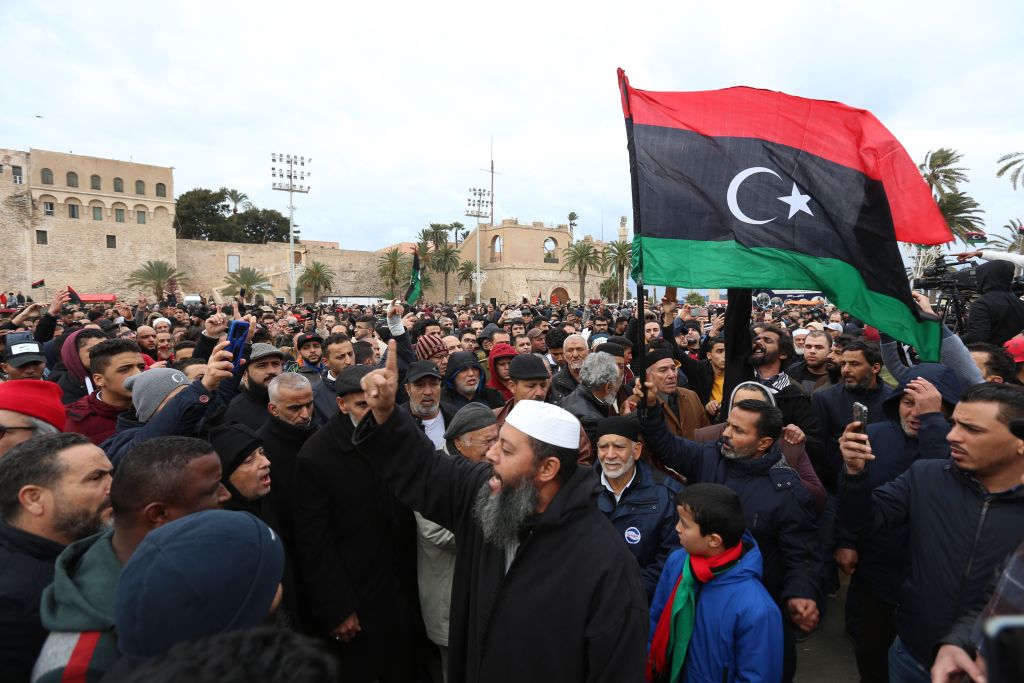
Big questions for Libya in 2020
Jonathan M. Winer
Non-Resident Scholar
The first days of 2020 have seen further sickening developments in Libya’s civil war. These include a horrifying aerial attack on Jan. 4 that killed and wounded dozens of unarmed young men assembled at a Tripoli military academy, and the fresh presence of hundreds of foreign fighters from Syria imported to Libya by Turkey in an effort by the Tripoli-based government, the Government of National Accord (GNA), to counter a similar number of Russian mercenaries deployed on behalf of General Khalifa Hifter.
Calls by the UN Secretary General for a cease-fire and renewed political talks have been ignored by the major foreign actors: Turkey and Qatar for the GNA; Russia, UAE, Egypt, Jordan, France for Hifter.
What happens next? Big questions include:
On the civil war: will the GNA forces collapse under the pressure of Hifter’s air campaign and foreign help, leading to an even uglier block-by-block ground war in Tripoli’s neighborhoods? What impact will the newly-arrived Turkish-sponsored forces have? Will the Libyans move beyond slaughtering one another to kill foreigners now in their midst? Will the proxy war stay limited to Libya, or have consequences beyond Libya’s borders — north, south, east or west?
On Libya’s oil: will the conflict force the National Oil Corporation to curtail production of the country’s principal source of revenue and if so, with what consequences for ordinary Libyans? Will any of the warring actors grab and divert the oil for themselves?
On who controls Libya: will Prime Minister Fayez al-Serraj survive a fifth year as Libya’s recognized leader? Will General Hifter instead emerge from the bloodshed and the rubble as Libya’s new dictator? Or will some other rough beast, its hour come round at last, slouch towards Tripoli to be born?
Strong U.S. leadership could still make a difference to counter the threats arising from the ongoing proxy war, but with President Donald Trump’s October decision to withdraw from Syria and the prospect of a forced U.S. departure from Iraq, the Trump White House appears mainly to have other things on its mind.

Stalemate and violence in Israel-Palestine
Nathan Stock
Non-Resident Scholar
The best-case scenario for Israel-Palestine in 2020 is some stabilization of the Israel-Gaza relationship. Indirect negotiations between Hamas and Israel continue regarding a series of measures designed to improve Gaza’s besieged economy. In exchange Gaza’s de facto Hamas rulers will be expected to curb demonstrations along Gaza’s border with Israel and prevent rocket and mortar attacks into Israel.
However, the building blocks for such an agreement have been on the table for years, with little progress. Israeli concessions to Hamas remain politically difficult, particularly as Hamas continues to hold the bodies of two Israeli soldiers killed in 2014. For its part, Hamas has had difficulty preventing projectile attacks into Israel, despite a strong desire to achieve a durable ceasefire. In the absence of a ceasefire agreement that meaningfully improves conditions in Gaza, a wider armed conflict remains a possibility.
If an Israel-Gaza agreement does happen in 2020, it will further reduce Hamas’s incentive to engage constructively with President Mahmoud Abbas, while increasing accusations from Fatah that Hamas seeks a Palestinian state in Gaza, separate from the West Bank. Holding long overdue elections for the Palestinian presidency and the legislative arm of the Palestinian Authority (PA) could be a step toward redressing the Fatah-Hamas conflict. President Abbas has called for elections and Hamas has agreed. However, the president has not issued a formal decree setting a date. Abbas insists he is waiting on Israel to respond to his request to allow Palestinians to vote in occupied East Jerusalem, as they did in past PA elections. The political climate makes it unlikely that Israel will again allow Palestinian voting in the east of the city. Abbas is likely using Israeli prevarication on Jerusalem as a pretext for avoiding an election he fears Fatah could lose. Thus, 2020 is unlikely to see Palestinian elections.
Finally, in theory the Trump administration continues work on its peace plan for the conflict. The administration released a fanciful economic vision for Israel and Palestine in the summer of 2019 that was silent regarding the vast power imbalance between the two sides. Since then the administration has reversed decades of policy and asserted that Israeli settlements are not “inconsistent with international law.” This makes it extremely unlikely that the Trump administration would exert the massive political and economic pressure on Israel that would be necessary to induce change in its policies toward the Palestinians.
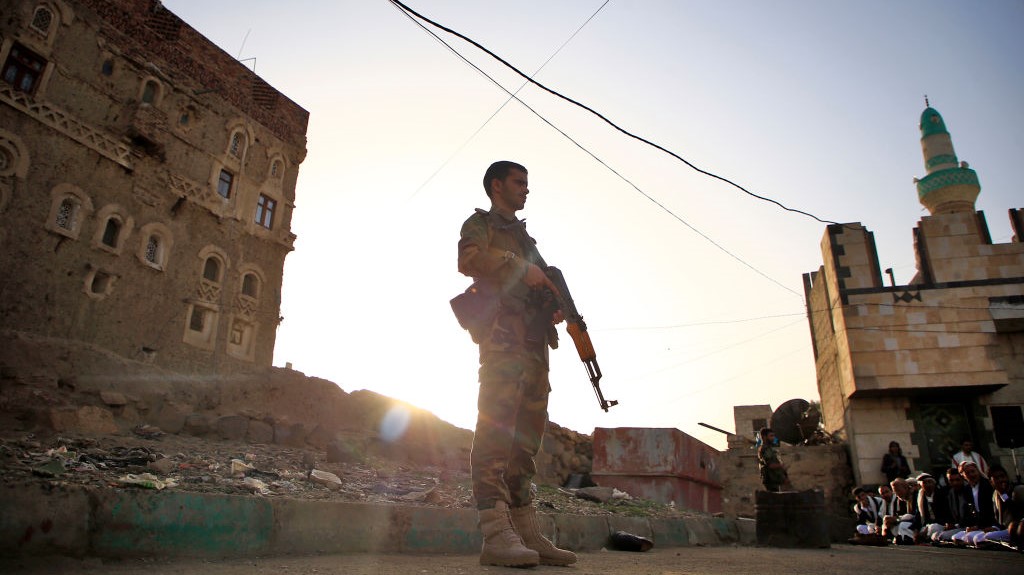
As the prospects for a deal recede, Yemen may be set for more turbulence
Fatima Abo Alasrar
Non-Resident Scholar
By the end of 2019, the main parties in Yemen's conflict were exploring prospects for de-escalation. Backchannel negotiations between Saudi Arabia and the Iran-backed Houthi movement brought with them hope for a nation-wide mediation process that would facilitate powersharing between Yemen's government and the Houthis. However, the prospects of such an agreement now hang in the balance pending Iran's response to the Jan. 3 assassination of Gen. Qassem Soleimani of the Revolutionary Guards. As Iran vows to avenge Soleimani’s killing, it is expected to do so through asymmetrical warfare tactics that would require the cooperation of its proxies in the region.
In the aftermath of the U.S. operation, the Houthis expressed solidarity with their Iranian backers, vowing that "Soleimani’s blood will not be wasted." As the Houthis consider themselves an essential player in Iran's "Axis of Resistance" network, their role will naturally focus on pursuing anti-Saudi operations as a blow to America's allies in the region.
Delays in achieving a peace deal will have consequences throughout Yemen, especially if the Houthi's power remains unchecked. The possibility that they will resume their military expansion to the South of Yemen or tighten their grip on Taiz, Yemen's third-largest city, remains high. The Houthis’ interest in destabilizing the South was made clear in the multiple drone attacks they launched into southern territory last year. Regaining control of the South, an area to which the Houthis have no historical or sectarian claim, would grant Iran access to the Bab el-Mandab strait and expand its sphere of influence in the Middle East.
Unfortunately, with the war in Yemen entering its sixth year, a delayed peace process is going to add a burden not just on the humanitarian situation, but on the ability of Yemen's government and the Saudi-led coalition to provide security and economic assistance to the areas under their control. The UN envoy must attempt to find a new agreement among all parties that would preserve the security and sovereignty of all territory, especially areas currently free or desiring to be free from non-state actors. Without guarantees that the Houthis will not expand in the same fashion they did after the UN-brokered Stockholm Agreement, Yemen's situation could become more turbulent and chaotic. Absent sustained steps toward de-escalation, the conflict could yet endure for years to come.
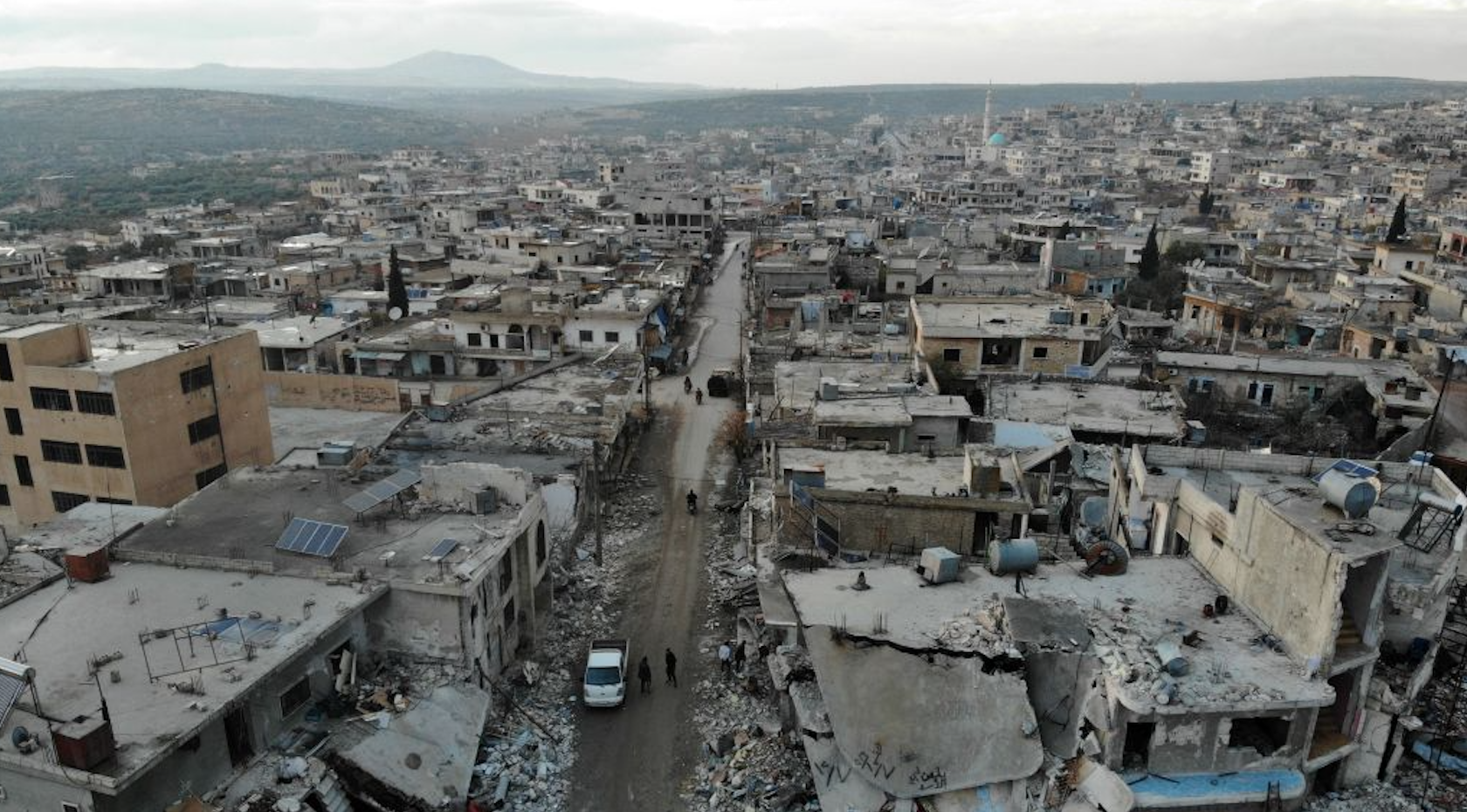
The prospects for Syria in 2020 are grim
Charles Lister
Senior Fellow, Director of the Countering Terrorism & Extremism Program
No matter where you look, the prospects for Syria and its people in 2020 seem extremely grim. Militarily, the most concerning issue remains the fate of Idlib, where at least three million people – roughly 16 percent of Syria’s in-country population – remain crammed in a killing-zone that encompasses just 3.5 percent of its territory. Though Turkey retains observation posts in Idlib, its ability to deter or prevent deadly regime escalation is at an all-time low. Should all-out war ensue, Ankara will revert to protecting its own national security interests, meaning locking down the border and abandoning Idlib’s population to a humanitarian crisis that will dwarf everything that came before it. In the chaos that would follow, dangerous and highly-experienced al-Qaeda terrorists are likely to escape, having recently re-embraced a global agenda.
Beyond Idlib, conflict looks set to continue in Syria’s northeast, where Arab-Kurdish and Turkish-Kurdish hostilities appear intractable. The U.S. position in the “Eastern Security Zone” will likely face an array of challenges, whether from ISIS, the pro-regime alliance, or the unpredictable Trump White House. Meanwhile, a fledgling armed resistance is growing exponentially in Syria’s southwest; ISIS will undoubtedly resurge, beginning in the central desert and spilling over the Euphrates; and the Iranian-Israeli tit-for-tat dynamic will continue and possibly worsen.
Beyond military developments, two other significant changes are likely to be economic and humanitarian. The passage of the Caesar Bill into law in the U.S. looks set to deal a death blow to what remains of the Syrian regime economy, crippling it internally and isolating it almost entirely from the global economy. If enforced, the bill could see Syria’s economy begin to resemble that of North Korea. Meanwhile, Russia’s veto in the United Nations of Security Council Resolution 2165 means that all cross-border aid into Syria will have ended on Jan. 10 – thereby cutting off all territories outside of regime control from much-needed aid. In so doing, the pro-regime alliance’s long-established strategy of bomb, siege, and starve will receive a huge boost.
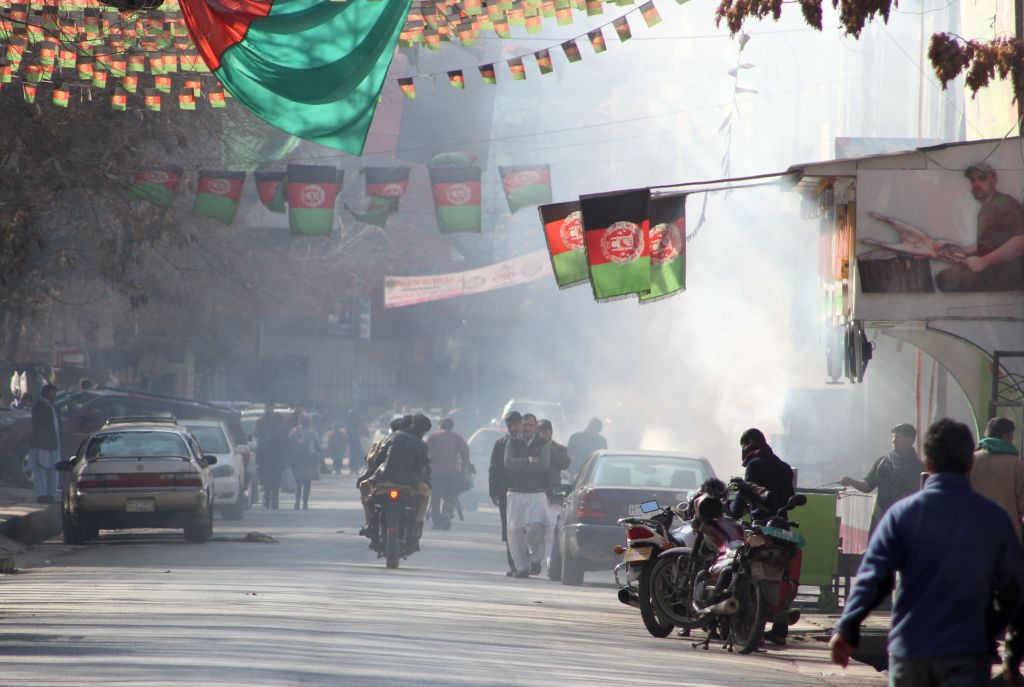
Uncertainty abounds for Afghanistan in 2020
Marvin G. Weinbaum
Director for Afghanistan and Pakistan Studies
The air of deep uncertainty that has for so long hung over Afghanistan’s future looms ever larger with the arrival of 2020. Among several unfolding developments contributing to the uncertainty and occupying much of the country’s immediate attention, two stand out. One involves whether there will be a government popularly accepted as legitimate going forward, the other questions the reliability of foreign military and economic backing for Afghanistan. Both will determine the character of the Afghan state and its ability to succeed against insurgency.
The country is moving to conclude a long-drawn-out electoral process that has been a case study in dysfunction. Officials and their election machinery have been unable to finalize, after a period of three months, the choice of president. With closure at best weeks away, whatever the final results, they will confirm a narrowly elected president whose mandate to govern will be based on the participation of barely 20 percent of those registered to vote. Bitterness over the disputed election may lead un-reconciled political opponents to extend the contest for national power, eroding an already weak regime’s authority and possibly hastening its replacement.
The commitment by its foreign benefactors to underwrite the Afghan regime’s viability and ability to withstand Taliban insurgency is in serious doubt. Most problematic is the intention of the United States in its continuing negotiations with the Taliban. Will an agreement reached with the Taliban — driven primarily by the desire for political cover for an early departure of American troops — put Afghan security forces at risk? Or will the U.S. instead insist, deal or no deal, on maintaining a residual counterterrorism force that can continue to bolster Afghanistan’s capacity to keep the insurgency at bay? And now might the U.S. reconsider plans for the reduction of any forces in Afghanistan in light of the looming conflict with Iran as 2020 begins?
Meanwhile, there remains for Afghanistan the uncertainty whether there will be any time soon intra-Afghan peace discussions leading to serious negotiations over power sharing and compromise on the shape of a new political system. And perhaps the greatest unknown is whether the Taliban, in the absence of a sustained comprehensive cease-fire, will be able in the new year to militarily succeed in wresting control over heavily populated areas of Afghanistan and thus render all the other uncertainties moot.
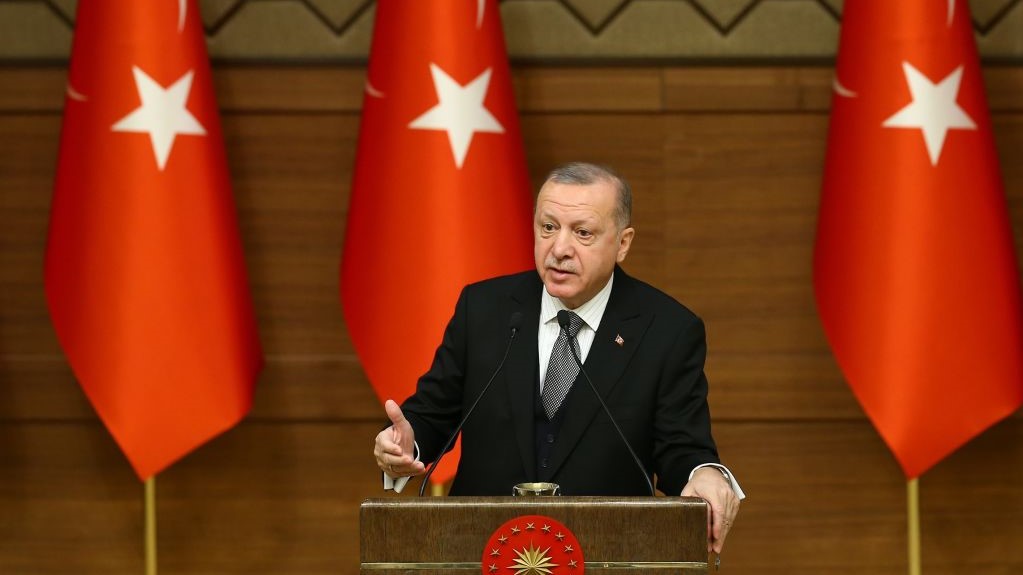
Storms on the horizon for Turkey in 2020
Gönül Tol
Director of the Turkey Program
2019 proved to be a difficult year for Turkish President Recep Tayyip Erdogan. At home, he faced several challenges, including a troubled economy, unrest within his own party, and a significant loss at the ballot box. The long-running problems in Turkey-U.S. relations got worse, Turkey-EU tensions heightened, and Ankara found itself isolated in the Middle East. Meanwhile, Turkey cultivated closer ties to Russia, but that partnership was not without its problems either.
Erdogan is hoping for a reversal of fortune in 2020. Presidential and parliamentary elections are scheduled to take place in 2023 but many in Turkey expect snap elections will be called this year. Although Erdogan insists the elections will be held as scheduled, he might be tempted to hold them earlier. Two important figures within the ruling party, former Economy Minister Ali Babacan and former Foreign Minister and Prime Minister Ahmet Davutoglu, are forming their own political parties while Erdogan’s ruling coalition is losing ground. Given the mounting economic problems and the prospect of U.S. sanctions, which could hurt the Turkish economy even further, Erdogan might want to hold elections in 2020 to mitigate the fallout of a worsening economy and deny the new parties enough time to organize.
In the past, Erdogan has used foreign policy, particularly Syria policy, as a tool to divert attention away from his political mistakes and mobilize his nationalist base. He is likely to stick to the playbook in 2020.
On Jan. 2, Turkey’s Parliament approved plans to send troops to Libya, aiming to bolster the UN-backed government in Tripoli that has been under siege from the forces of Gen. Khalifa Hifter in eastern Libya. Erdogan is hoping to kill several birds with the Libya stone. He eyes the country’s energy resources, wants to salvage billions of dollars of business contracts thrown into limbo by the conflict there, and hopes to increase Turkey’s room to maneuver in the eastern Mediterranean, where an anti-Turkey camp including Greece, Cyprus, Egypt, and Israel has formed. But Turkey’s Libya gambit may create further headaches for Erdogan. Russia and Turkey are backing opposing fronts in the Libyan conflict and Moscow warned Ankara against its troop deployment. The two are already having problems in Syria’s Idlib Province, where a regime offensive is threatening Turkish military outposts and another refugee flow toward the Turkish border. A controversial decision by Erdogan might add to all that.
Erdogan has recently revived plans to dig a canal on the edge of Istanbul, possibly undercutting the 1936 Montreux Convention governing the Turkish Straits. In a TV interview he said military ships can use the canal instead of the Bosphorus Strait. The 20th-century agreement limits and regulates deployments in the Black Sea for navies not belonging to Black Sea littoral states, including navies from NATO. The convention has been an issue for the U.S., particularly at times of heightened tension with Russia. Whether the canal will undercut Montreux or not, Erdogan’s recent statements hinting at his desire to do so will surely raise eyebrows in Moscow. 2020 may just be as stormy as 2019 for Erdogan.
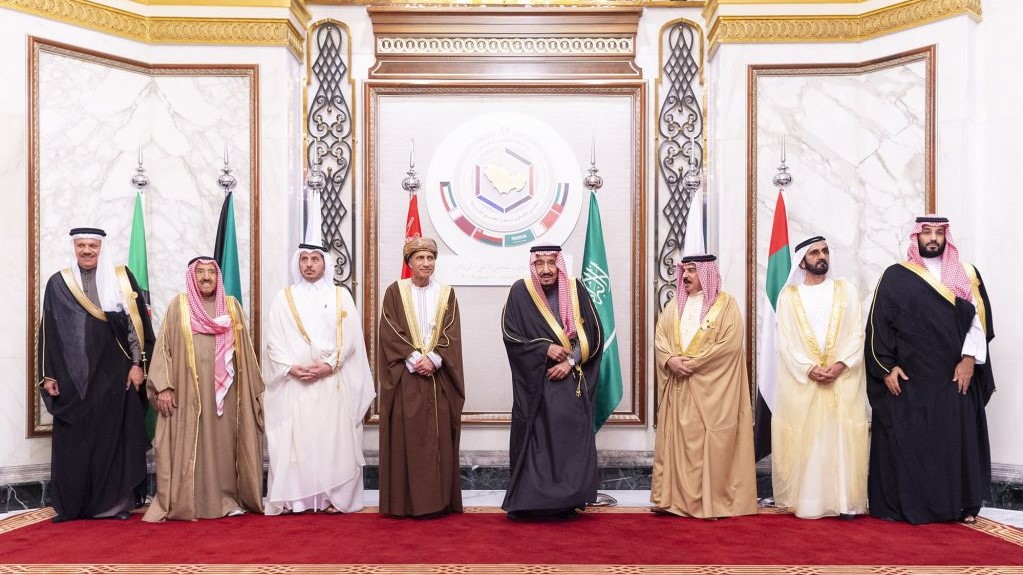
The Gulf in 2020 faces many questions, few answers
Gerald Feierstein
Senior Vice President
The assassination of Qassem Soleimani is only one factor clouding prospects for the Arab Gulf states in 2020. But it is certainly a critical one: will Iranian probable retaliation for Soleimani’s death focus on targets in the Gulf Cooperation Council (GCC) member states; how will his death affect putative steps, especially by Saudi Arabia and the United Arab Emirates (UAE), to calm tensions with Iran and open a path for diplomacy; and what effect will his departure have on the Houthis and the continuation of the civil war in Yemen? Perhaps most importantly, will the rise in tensions push the GCC states to resolve their own internal conflicts or will it open new fissures in Gulf state solidarity? Thus far, the reaction to Soleimani’s assassination among the Gulf states has been cautious. Both the Saudis and the Emiratis have publicly distanced themselves from the decision while Oman, the state that has often served as Tehran’s bridge to the GCC, expressed regret at the action and urged a return to dialogue.
Questions about leadership will also feature prominently in Gulf developments over the coming year. International reaction to the announcement that a Saudi court had condemned five men to death for the murder of Jamal Khashoggi, an action widely perceived as approved if not ordered by Crown Prince Mohammed bin Salman, renewed doubts about his fitness as an international partner. Meanwhile, Sultan Qaboos’ rapid return from what had been an expected longer stay in Brussels for cancer treatment revived concerns that he was losing his years-long fight against the disease, throwing Oman’s future leadership into doubt.
As 2019 came to a close, tentative signs had pointed in a more positive direction for the New Year. Beyond hints of a thaw in the Gulf stand-off with Iran, possibilities for an end at least for major conflict in Yemen brightened as the Saudis engineered a reduction of tensions between the Hadi government and its southern opposition and engaged the Houthis in a new round of negotiations. Meanwhile, the Saudis and Qataris also took hesitant steps to bring an end to two-plus years of fruitless confrontation. Certainly neither issue appeared close to resolution. The intra-GCC dispute fractured the organization and likely will take years to repair. Even an end to major conflict in Yemen will mark only the beginning, not the end, of Yemen’s long, difficult road to political, economic, and social recovery. But these first steps had raised hopes that 2020 would end on a more positive note than it began.

A hectic year for Egypt
Mirette F. Mabrouk
Senior Fellow, Director of the Egypt Program
The only prediction that one can make for certain for Egypt’s coming year is that it will be a hectic one.
On the economic front, Egypt has done well, showing strong macroeconomic recovery with inflation falling and unemployment dipping to 7.5 percent. A rise in bank landing toward the end of last year would seem to indicate that fixed investment is holding up and the country’s relentless attempts at improving the ease of doing business are paying off, as highlighted by the World Bank’s new Doing Business report. That should support fixed investment which, in turn, will stabilize growth rates. Egypt will have to scramble to attract non-energy foreign direct investment and improve its export market. And it will have to continue trying to assist those citizens affected by the same austerity measures that have proved so useful for improving its macro outlook.
On the domestic side, it remains to be seen whether the political changes promised in the wake of small demonstrations last September will come about.
The foreign policy front is even more complicated.
On Jan. 13, Egypt, Ethiopia, and Sudan will meet in Washington, DC to try to hammer out an agreement over water sharing and the Grand Ethiopian Renaissance Dam (GERD). Nearly completed, it will be the largest hydroelectric dam on the continent and has the potential to cut off the Nile water that supplies Egypt with 97 percent of its fresh water supply. The talks had been at a stalemate for years until the intervention of the U.S. and the results are of existential importance to Egypt.
To the west, the rapidly evolving situation in Libya is causing a major governmental migraine. While Egypt has supported both Fayez al-Serraj’s internationally recognized Government of National Accord (GNA) and Khalifa Hifter’s Libyan National Army (LNA), the latter has received major attention, since Egypt is worried that Serraj is weak and overly susceptible to pressure from Islamist militias. Following a recently signed military agreement between Serraj and Turkey’s Recep Tayyip Erdogan, the Turkish president announced today that Ankara would start sending troops to Libya. These may include Syrian rebel fighters. The agreement “allows” Turkey to drill for gas in marine territories contested by the Greeks and Cypriots, potentially putting it in conflict with those countries and the other five members of the Eastern Mediterranean Gas Forum: Egypt, Italy, Palestine, Israel, and Jordan. The potential for regional conflict is enormous.
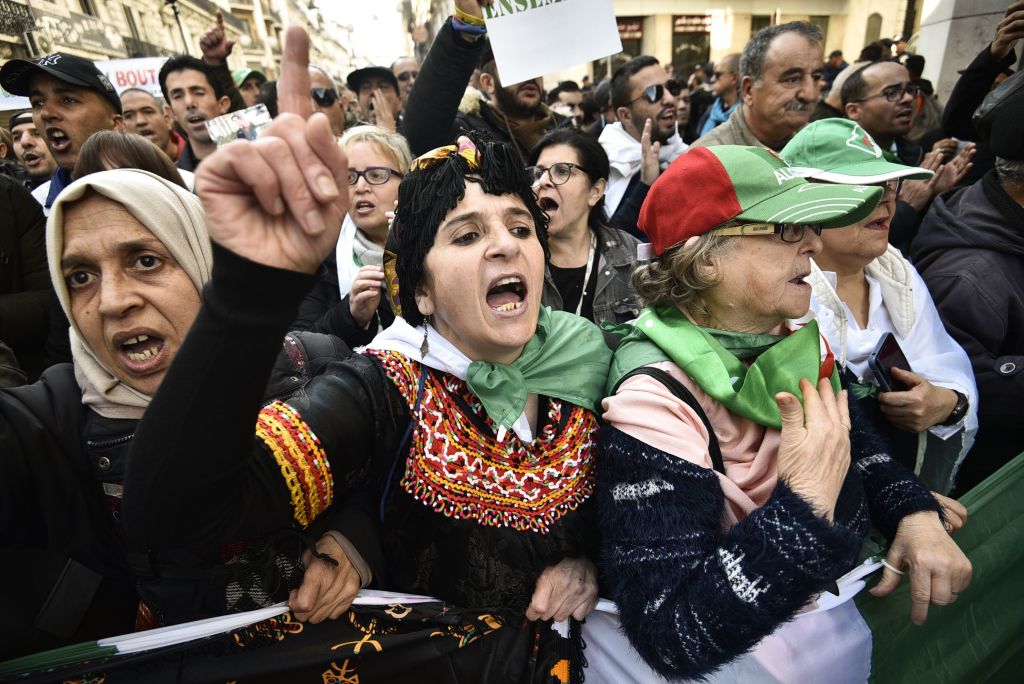
Algeria remains in crisis
Robert Ford
Senior Fellow
Large street protests across Algeria on Jan. 3 made clear the country is still in crisis. The loosely organized protest movement is doubling down on demands for the liberation of detained activists, relaxation of government controls over associations and media, and a drastic change in the political system. Newly elected President Abdelmadjid Tebboune can try either to seduce and diminish the protest movement by responding selectively to its demands or by cracking down hard with all the risks that would follow. The new cabinet appointed on Jan. 3 suggests continuity, not change; a third of the ministers, including the prime minister and key cabinet posts, went to carryovers from previous governments.
In a signal to the protesters, however, Tebboune released 76 detained activists on Jan. 2, and the presidency stated it hopes to launch a serious dialogue with the political opposition and the protest movement. About half of the activists arrested remain in detention, and the protest movement rejects dialogue without more gestures from the government. Only a few political parties have responded favorably to Tebboune’s call for dialogue, and political parties in any case lack influence over the street protesters. Tebboune and the government will explore whether they can placate the protest movement with reforms to the constitution and election law; they will also need to decide whether to relax the grip on civil and political activities. The Algerian army in 2019 had resisted any opening, but its top leader died suddenly on Dec. 23. The new top general, 74-year-old Said Chengriha, has taken a far less public role than his hardline predecessor. The relationship between Tebboune and the army leadership will be a major factor influencing Algeria’s evolution.
The economy needs urgent attention after stagnation during the era of former President Abdelaziz Bouteflika. Foreign exchange reserves are ample enough for several more years, but growth has stagnated due to declining investment. Budget deficits and inflation are rising. Tebboune’s government needs to determine how to boost investment to diversify the economy and expand job creation to address a young population’s dissatisfaction. The new year will show whether technocrats brought into the new cabinet have the vision and political backing to finally start serious liberalization of an economy long dominated by state’s energy industry that itself needs massive new investment.

Demand — and scrutiny — of hacking tools set to rise
Michael Sexton
Fellow, Director of MEI's Cyber Program
As internet penetration approaches saturation in parts of the Middle East, more people will be communicating through popular chat services like WhatsApp, Messenger, and Telegram. A key way these services differentiate themselves is by incorporating strong encryption of data-in-transit to keep users’ chats private. The same trend has been ongoing for encryption of data-at-rest in the smartphone market for years. The increasing ubiquity of encryption is a boon for privacy and human security, but it poses a challenge to lawful intercept imperatives for law enforcement and intelligence services around the world.
The prospect of an encryption “backdoor” for law enforcement that doesn’t undermine privacy for all users is technologically unfeasible, so the demand and market for hacking tools to bypass this encryption are set to remain and expand in 2020. Hacking tools and capabilities generally proliferate with positive intentions: disrupting terrorist plots, thwarting human trafficking, and combatting child pornography. Once a government has these tools, however, little can be done to prevent it from using them against political activists and organizers.
Neither encryption nor hacking tools are new, but 2019 has seen pointed scrutiny and rancor over both. Senator Lindsay Graham has threatened Apple and Facebook, saying that if they do not develop encryption backdoors, “we will impose our will on you.” Criticism of the Israeli hacking tool vendor NSO Group peaked in 2019 when Facebook filed a lawsuit against the firm for breaching Facebook-owned WhatsApp. These counteracting trends raise hard questions: what role, if any, should private hacking tool vendors have in counterterrorism and international security? How can their proliferation be regulated, if at all, and by whom?
This dilemma is especially pronounced in the Middle East: Many companies in the hacking tool space are based in Israel; proximity to militants and lawless spaces in Yemen, Syria, and northeastern Africa drive up demand; and the Israeli government sees its dominance in the market as an effective way to make new friends. That transfer of technology and offensive capability is likely to continue and drive up risks to human and international cybersecurity in 2020.

Israel in 2020: Heading for yet another election
Paul Scham
Non-Resident Scholar
“Since the destruction [of the Second Temple in 70 C.E.], prophecy is entrusted only to fools and children.” Babylonian Talmud: Tractate Baba Batra 12b.
Israelis have been looking forward with little enthusiasm to their third general election within a year, scheduled for March 2, with the expectation that it is likely to be as inconclusive as the last two. The main difference is that Prime Minister Benjamin Netanyahu, who is himself the major issue in the race, has now been indicted on counts of fraud, breach of trust, and bribery, and has petitioned the Knesset for immunity from prosecution until the election. The whole issue is now in a legal no-man’s-land, but politically Netanyahu seems to be about as popular as before his long-awaited indictment, which portends another inconclusive election and a political system unable to break the deadlock. But Netanyahu, now Israel’s longest serving premier, is likely to be on his way out within the year, one way or the other.
Of course the whole Middle East was thrown into another no-man’s-land when Iranian General Qassem Soleimani was assassinated by a U.S. drone on Jan. 3, but Israel was one of the very few countries that publicly cheered the news. It is also an obvious target for retaliation, but Israelis have felt under threat by Iran long enough that the unsettled situation seems to have engendered little panic. It might provide a boost to Netanyahu in the polls, given his close relationship with President Donald Trump, but no polls have been released since the assassination.
Under cover of the continuing political stalemate, Israel’s military has come up with a tentative long-term truce with Hamas, which it hopes a new government will approve — tacitly, since neither party will admit negotiating with the other. Such a truce will make it even easier for Israel to avoid negotiating an end to the conflict with the Palestinians, as it will pound another nail in the coffin of Palestinian unity. It is notable that the last year, consumed with preparations for and stalemated results of Israel’s elections, has been one of the quietest years in the history of the conflict, with no government capable of taking anything but either routine actions, on the one hand, or responding to emergencies, on the other.
Israel will likely remain as politically and culturally polarized as it has been for the last few years, while its economy remains in generally good shape. Obviously, however, if a war involving Iran indeed transpires, all bets are off.
The Middle East Institute (MEI) is an independent, non-partisan, non-for-profit, educational organization. It does not engage in advocacy and its scholars’ opinions are their own. MEI welcomes financial donations, but retains sole editorial control over its work and its publications reflect only the authors’ views. For a listing of MEI donors, please click here.













